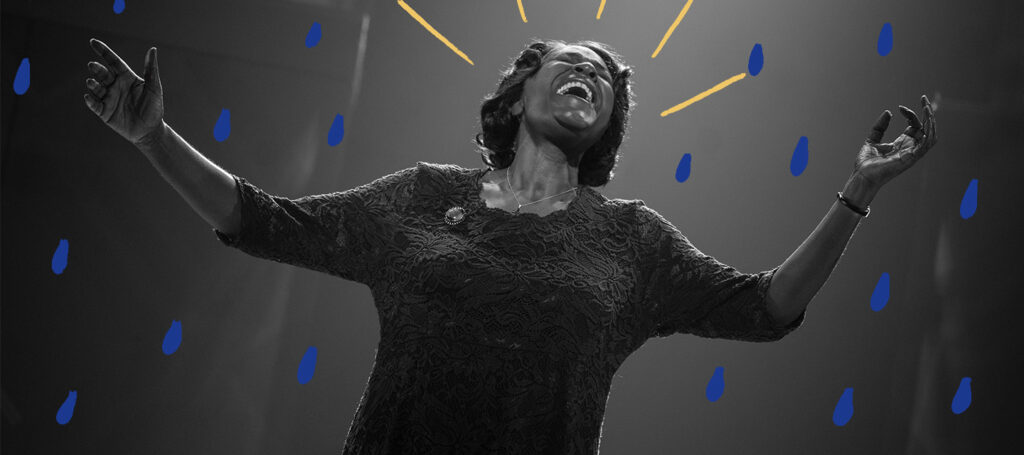


Caroline, or Change: Inertia Buries a Musical Masterpiece
When Caroline, or Change premiered on Broadway in 2004, critics lacked the imagination to appreciate what they had been given: a story that prioritized how many Black women bury their trauma in order to survive.
Fifteen years later, one prominent theatre critic acknowledged that he was finally able to receive the glory of the story thanks to the then-current West End production, which opened on Broadway tonight. All it took was the repeated, recorded, state-sanctioned murders of Black men to open his and other critic’s eyes to the relevancy of our lives―though it is a wonder that it was this enervating production that reached him.
Caroline, set in 1963, follows the life of Caroline Thiebedux (Sharon D. Clarke) a Black single mother of four, who is paid just enough to strangle herself as the maid of a Jewish family in Lake Charles, Louisiana. Caroline is constantly on the verge of snapping from loneliness, after being abandoned by her abusive husband, and despair over her dire financial situation.
Rather than seek friendship with her fellow maid, Dotty Moffett (Tamika Lawrence), Caroline processes her gloom by interacting with her subconscious thoughts, which take physical form and converse with her as the spirits of her washing machine (Arica Jackson), her radio (the Supremes-like trio of Nasia Thomas, Nya, and Harper Miles), and a devilish dryer (Kevin S. McAllister) which tortures her with its heat.
Caroline’s tale intersects with Noah Gellman’s (Jaden Myles Walman at the performance I attended), an eight-year-old boy who she looks after. Though she does not like him, Noah worships Caroline as his surrogate mother in the wake of his own mother’s death. To him, she is even stronger than his dad.
The change that is referenced in the show’s title comes from the societal upheavals that Tony Kushner has written into the book, as well as a house rule that Rose Stopnik Gellman (Caissie Levy), Noah’s new step-mother, institutes―rather than give Caroline a raise, she deigns that any money that Noah leaves in his dirty clothing will now belong to Caroline. This comes to a head later on in the show when the cost of letting go of these additional coins becomes too high.
It’s kitchen-sink drama to be sure, but as penned by Kushner and scored by Jeanine Tesori, it is clear that the stakes are life and death for these strivers in the Confederate South, where Jewish people are fighting to be seen as fully white, and Black people are simply trying to avoid having their faces buried in the bog.
In dedicating this story to his childhood nanny, Maudie Lee Davis, Kushner uses the sung-through, genre-ranging, musical masterpiece to honor the silent burden that Black women have long been forced to bear in this country. It’s the same silence that Caroline maintains in the face of her new boss―because voicing her rage at constantly being undermined, condescended to, and forced to agree with passive-aggressive edicts might obliterate the world around her.
This reality is instantly recognizable to many Black and Brown audience members, who have watched the women in their lives reduce themselves, lest they frighten their white employers. It is a story that continues to haunt many Black and Brown families across the United States, even in our current “woke’ era―and yet, it is all but unrecognizable in the Roundabout Theatre Company revival of Caroline that is playing on Broadway at Studio 54.
As directed by Michael Longhurst, this West End transfer has been deprived of all urgency and bite. When arguments rear their heads, rather than speed into them with the breath of life, the pacing becomes logy as the actors begin to articulate each word over-emphatically so that all nuance is lost. It is almost as if Longhurst does not trust the audience to recognize the obvious abuse of unequal power dynamics that are littered throughout the script.
This approach at obvious-mountain storytelling continues with the miscasting of John Cariani―who performs his own clarinet playing but cannot sing the ardent tenor part―and Fly Davis’ cartoonish costume designs: the Washing Machine is dressed like a bubbly character from The Jetsons; the Dryer is a shell-shocked looking hobo; and rather than leave the idea of how Caroline’s sexy, former navy-man husband looks to the imagination, Kevin S. McAllister is draped in an all-white, shore leave get-up that renders him goofier looking than Dopey of Snow White’s seven dwarves.
Worse than these costume choices, and Amanda Miller’s cheap-looking wig design, is Longhurst’s decision to have Caroline’s thoughts interact with her on the revolving stage. With so many bodies cluttering the main playing field, sightlines are often obscured and dramatic focal points lost.
Another unintended consequence of watching Caroline engage with her imaginary friends for physical support is that one begins to wonder if she is mentally unwell. That’s an unfortunate insinuation, not only because it is unsupported by the text but because it undermines the strength of Black women everywhere, who make it through these situations daily, and who cannot afford to reveal their injuries publicly.
Rather than engage with this, Clark’s Caroline visibly bristles whenever she is misnamed by Rose. In a NYTimes profile, Clarke explained that she chose this reaction because she didn’t want audiences to think that Caroline is just an “angry Black woman.” This level of indicating and commenting on the action is in service of white people who might otherwise miss what many know too well. While making Black women more sympathetic to white audiences might be a lofty goal, it makes for poor storytelling and defangs the moment when Caroline is actually, undeniably defiant, rather than simply shrewd at getting around her meddling employer.
Tonya Pinkins, who originated the role at the Public Theatre, on Broadway, in the West End, and in Los Angeles, played this contrast of seething politeness and selective hostility brilliantly. Rather than employ stealthy tactics, Clarke betrays the game as soon as she appears onstage, leaving her with nowhere to build. She is not helped by timid vocal performance which appears to be geared towards saving her throat for Tesori’s vocally exacting score. Perhaps Clarke needs a standby to perform the matinees. Given that this is essentially an opera, that would be reasonable. What is unacceptable is waiting for a star’s vocal payoff that never arrives.
Luckily, the vocal brio that audiences are expecting is delivered by the stellar Radio trio (Thomas, Nya, and Miles), dryer and bus (McAllister), and Levy, who emerges as the emotional heart of this production. Levy’s Rose models herself in the mold of an annoyingly wispy-voiced, Stepford wife knock-off who just wants to make everyone happy, but who pounces with a ferocious belt during her emotional asides to the audience. We should not be rooting for her, and yet, because she gives the only complete and nuanced performance in the show, the prize is hers.
Caroline, or Change is my favorite musical in the world. Seeing the original production changed my life by showing me that it is possible to push beyond traditional theatrical renderings of the inner lives of Black people and to show us in all of our complexities, rather than demanding that we be perfect heroes. I believed in the flaws and neediness of the characters in each of the five previous productions of Caroline that I attended. I believed in next to nothing of what I saw in this revival.
The audience gave the two hours and 40 minutes-long performance I attended a standing ovation. Despite this reality, I believe that they were actually applauding the gift of finally observing a worthwhile theatrical view of a Black woman who is living in poverty. If one must attend this milquetoast production, I suggest that they rush home afterward to listen to the original cast album. There, the true Caroline continues to sing out with the glory that we all deserve.
Keep Reading

‘Dana H’: In Her Own Voice
There’s something sinister about a motel room. I think of buzzing fluorescent lights, the lingering scent of tobacco on every surface, nondescript paintings over nondescript wallpapers, and faint conversations from the next room. I’ve got vivid memories of those details, all of which could’ve been from an actual stay in a motel somewhere along a […]
Read More
‘The Lehman Trilogy’: Soulless and Expensive Children’s Theatre for Adults
Soulless and expensive―that’s the best way to describe the Broadway debut of The Lehman Trilogy at the David T. Nederlander Theatre. But then, what else should one expect from a 3 hour and 15-minute long theatrical-ish spectacle devoted to the history of one of the world’s largest financial firms? Es Devlin’s austere corporate office design […]
Read More












